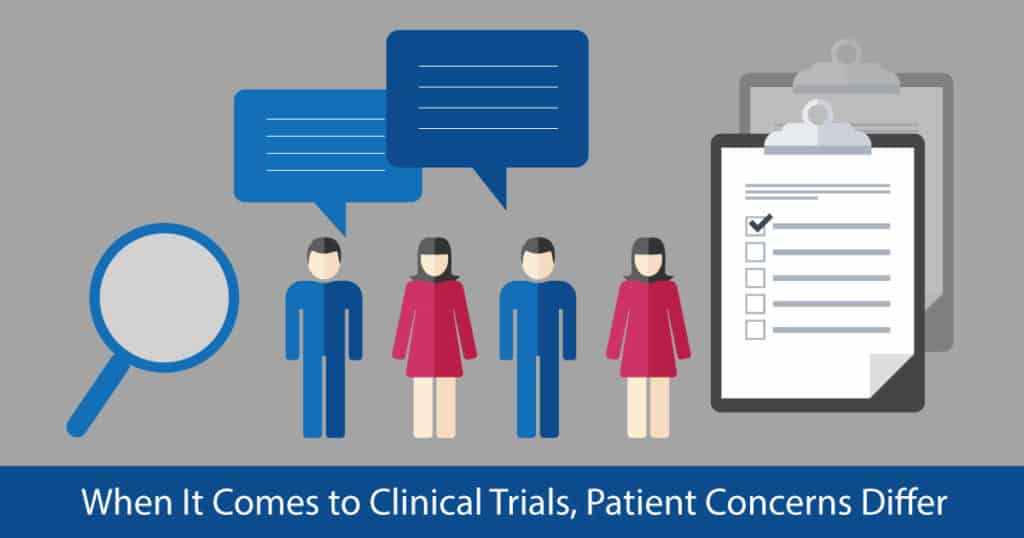When It Comes to Clinical Trials, Patient Concerns Differ

By Kathleen Hoffman, PhD, MSPH
In 2019, Inspire researched patients and caregivers feelings about, and understanding of, clinical trials. Over 1500 members (1644) participated: Members with arthritis, colorectal cancer, prostate cancer, psoriasis, ovarian cancer, sarcoidosis and scleroderma. The findings show that these groups have different understandings of and concerns about clinical trials.
Sixteen percent of the participants had already participated in clinical trials. Another 15 percent had tried to participate in a clinical trial but 1) were not eligible, 2) the clinical trial was full or 3) they were not contacted by the study. Twenty-two percent said they would only participate in a clinical trial if they had no other options.
Respondents seemed familiar with the language of clinical trials. Almost 70 percent knew the meaning of the term “double blind study” and 72 percent knew the meaning of the term “clinical trial protocol.” People who indicated “knowledge but not expert knowledge” provided sophisticated definitions of clinical trial protocol:
“It’s basically how the trial will be conducted in terms of entry conditions, treatment method and frequency, testing method and frequency, etc.”
A member who indicated they were “somewhat familiar” with the term “double blind study” defined it as:
“How the trial is structured to give the most informative results, and is reproducible by others. No cheating to get the results wanted.”
What is your biggest concern about clinical trials?
Though there was some familiarity and interest in research and clinical trials, it is informative to note that the answers of patients with sarcoidosis and their caregivers differ from patients with prostate cancer and their caregivers when asked the open-ended question, “What is your biggest concern about clinical trials?”
Of the two hundred and fifty-two members with sarcoidosis who took the survey, 118 members (47 percent) answered this question. Two hundred and ninety-eight members with prostate cancer completed the questionnaire and 127 (43 percent) answered the question.
For those with sarcoidosis, “side effects” were the biggest concern: 23 percent of their answers mentioned them. The biggest concern for members with prostate cancer was “safety and risk”: 20 percent of the answers discussed this subject. Prostate cancer patients also mentioned being concerned about getting the “placebo” in 17 percent of the answers, while those with sarcoidosis mentioned it in only 4 percent of the answers. Those with sarcoidosis worried about costs to the patient of being in a clinical trial (11 percent of answers), less than 5 percent of answers from prostate cancer patients mentioned a patient’s financial burden as a concern.
Misconceptions about clinical trials differ between the two groups. One member with prostate cancer believed “…that people on the placebo may not be watched carefully enough.” Another worried about, “[B]eing the one on a placebo when the real drug shows lots of promise.”
Strangely, both groups had a member that was concerned about whether patients knew that they could leave a trial.
“My Mom and her oldest brother participated in studies. The hard part is when their health was failing, and they wanted out. the people running the studies made it hard for them to withdraw.”
“That the doctor fully and clearly explains what the patient is getting in to … and that patient understands they can pull out anytime.”
Unfortunately, both groups also had members that misunderstood the rationale for clinical trials. They asked if there was a “Conflict of interest since they are funded by the companies that want to sell the drugs,” or wondered “If the people running it are only doing it to make money.“
Although there is interest in clinical trials, even these patients have serious misconceptions as to how they are run, what they are about and the motivations behind the research. One voiced the concern that if they participated they would “…be subject to statistical based decision making rather than my individual best interests.”
The Inspire research about our members’ relationship to the world of clinical trials bears out the findings recounted in our January 7th post, “No ‘One Size Fits All’”: While some of the concerns are general, the specific needs of patients and caregivers often differ based on the disease and on their point in the patient journey.
The implication is that researching patient understanding and experience is valuable. When done in advance of or along with clinical trial design, educational materials and trial processes can be fine-tuned to meet the needs of the people they are intended to help. In turn, those materials better support recruitment and retention through the life of the trial. Ultimately, listening to the patients and caregivers early-on is an effective use of resources, both economically and scientifically.
For more results from this study, see “Are You Listening to Patients? Patient Preferences and Clinical Trial Design” and download our webinar “A Hopeful Mindset: Patient Insights on Clinical Trials.”
Inspire offers a trusted community to patients and caregivers. Our goal with this blog, this website and our content is to provide the life science industry access to the true, authentic patient voice. In so doing, we support faithful operationalization of patient-centricity. Take a look at our case studies, eBooks and news outlet coverage.






